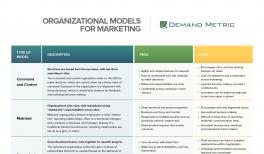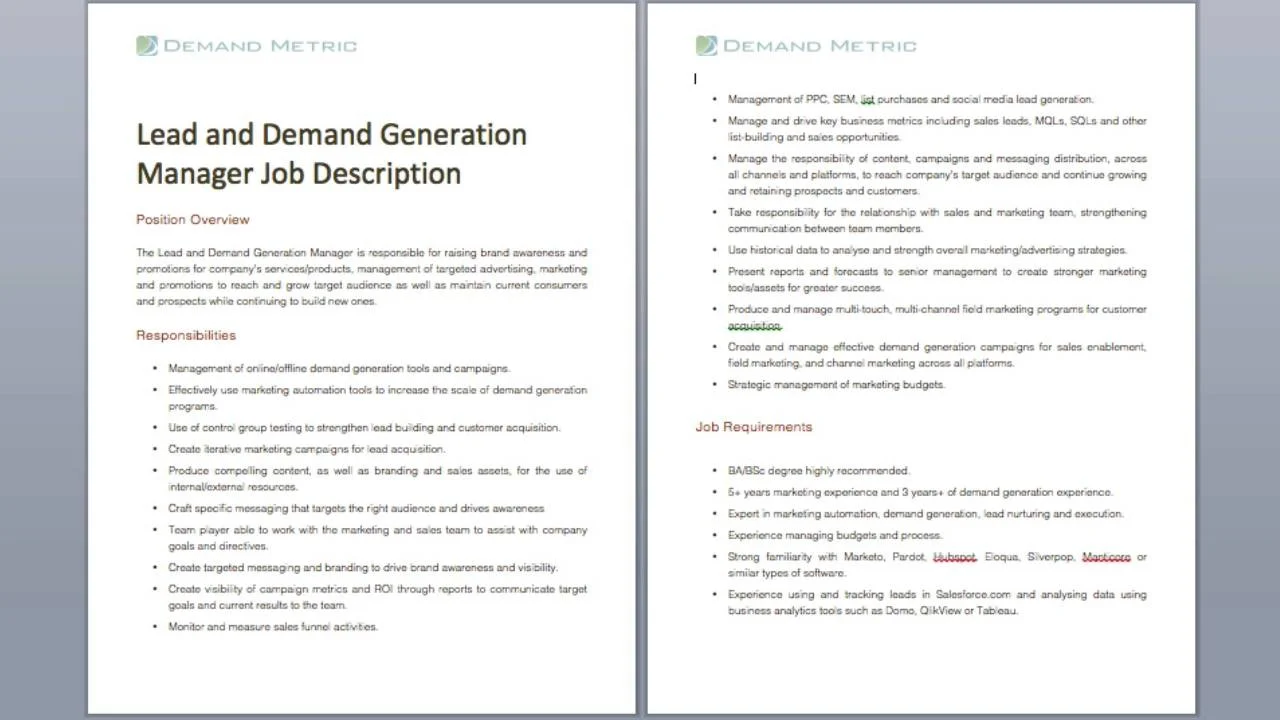As a Demand Generation Marketing Manager, you will be responsible for creating and implementing strategies to generate and nurture leads, ultimately driving sales and revenue for the company. You will oversee the marketing funnel, leveraging various channels to attract and engage potential customers, and work closely with the sales team to ensure alignment and conversion optimization.
In today’s competitive business landscape, the role of a Demand Generation Marketing Manager is critical to success. Your expertise in utilizing various marketing tactics, including digital advertising, content marketing, and lead nurturing, will be essential in reaching and converting the target audience.
By developing and executing innovative demand generation campaigns, you will play a pivotal role in driving growth and contributing to the overall success of the organization.
Key Responsibilities
A Demand Generation Marketing Manager plays a crucial role in attracting and converting leads to customers. Let’s dive into the key responsibilities of this role:
Strategy Development
Develop comprehensive marketing strategies to drive demand and achieve company goals.
Analyze market trends and competitors to identify opportunities for growth.
Collaborate with cross-functional teams to align strategies and optimize outcomes.
Campaign Execution
Plan and implement multi-channel marketing campaigns to reach target audiences.
Monitor campaign performance and make data-driven adjustments for optimal results.
Ensure campaigns are executed on time and within budget to maximize ROI.
Lead Generation
Develop lead generation strategies to capture and nurture quality leads.
Implement lead scoring and qualification processes to prioritize leads for sales teams.
Utilize marketing automation tools to streamline lead generation efforts and maintain lead database.
Market Analysis
Conduct market research to understand target audience preferences and behaviors.
Track key performance metrics to evaluate marketing effectiveness and inform decision-making.
Stay updated on industry trends and adjust strategies accordingly for maximum impact.

Credit: www.velvetjobs.com
Qualifications
The Demand Generation Marketing Manager job description typically requires qualifications such as a strong background in marketing strategy, experience in lead generation tactics, and proficiency in data analysis. Additionally, candidates should possess excellent communication skills and be adept at project management.
Education
An essential requirement for a Demand Generation Marketing Manager is a strong educational background. Typically, a bachelor’s degree in marketing, business administration, or a related field is preferred. This foundational knowledge equips individuals with a solid understanding of marketing principles and strategies, which are crucial for success in this role.
Experience
Along with education, experience is a key aspect of the Demand Generation Marketing Manager role. Employers usually look for candidates who have previous experience in marketing or related positions. This experience helps individuals develop the necessary skills and knowledge required to excel in driving demand and generating leads. Candidates with a proven track record of implementing successful marketing campaigns and achieving measurable results stand out as strong contenders for this position.
Skills
In addition to education and experience, certain skills are crucial for a Demand Generation Marketing Manager to effectively carry out their responsibilities. These skills include:
- Strategic thinking: The ability to assess market trends, identify target audiences, and devise comprehensive marketing strategies that align with business goals.
- Data analysis: Proficiency in analyzing marketing data and metrics to evaluate campaign performance and make data-driven decisions for optimization.
- Lead generation: Expertise in generating and nurturing leads through various channels, such as email marketing, content marketing, and social media.
- Technology proficiency: Familiarity with marketing automation tools, customer relationship management (CRM) systems, and other marketing software to streamline processes and measure campaign effectiveness.
- Collaboration: Strong communication and collaboration skills to work effectively with cross-functional teams, including sales, content, and design, to execute integrated marketing campaigns.
- Creative thinking: The ability to think outside the box and come up with innovative marketing ideas and solutions to engage target audiences and differentiate from competitors.
- Project management: Effective project management skills to plan, execute, and monitor marketing initiatives within specified timelines and budgets.
Key Skills
A Demand Generation Marketing Manager needs a specific set of skills to effectively drive demand and generate leads. The role requires a blend of analytical, communication, and project management skills to strategize, execute, and measure successful marketing campaigns.
Analytical Skills
Analytical skills are indispensable for a Demand Generation Marketing Manager as they are tasked with analyzing marketing data, identifying trends and patterns, and using insights to make informed decisions about campaign optimization and lead generation strategies.
Communication Skills
Clear, concise, and persuasive communication skills are essential for a Demand Generation Marketing Manager to convey marketing strategies, collaborate with internal teams, and create compelling content that resonates with the target audience.
Project Management
Effective project management is vital in this role, involving the capability to plan, execute, and monitor complex marketing initiatives, manage budgets, and coordinate various marketing activities to meet set objectives and timelines.

Credit: www.demandmetric.com
Tools And Technology
A successful demand generation marketing manager relies on various tools and technologies to streamline their activities, analyze data, and engage with potential customers. The right set of tools can significantly impact the effectiveness and efficiency of demand generation strategies. Here are the essential tools and technologies utilized by demand generation marketers:
Crm Systems
Customer Relationship Management (CRM) systems play a crucial role in managing and nurturing customer relationships. These platforms enable marketing professionals to track interactions, manage leads, and provide personalized experiences. Popular CRM systems include Salesforce, HubSpot, and Zoho CRM.
Marketing Automation Platforms
Marketing automation platforms are essential for automating repetitive marketing tasks, such as email campaigns, social media posting, and lead nurturing. These tools streamline processes and enable personalized communication at scale. Leading marketing automation platforms include Marketo, Pardot, and Eloqua.
Analytics Tools
Analytics tools are indispensable for monitoring and evaluating the performance of demand generation campaigns. These tools provide valuable insights into customer behavior, campaign effectiveness, and return on investment. Google Analytics, Adobe Analytics, and Mixpanel are popular choices for comprehensive data analysis.
Career Path
When it comes to the career path of a Demand Generation Marketing Manager, there are various potential titles, growth opportunities, and salary expectations that professionals in this role can look forward to. Let’s explore these aspects in detail:
Potential Titles
As a Demand Generation Marketing Manager, individuals can expect to find themselves in positions such as:
| Title | Description |
|---|---|
| Marketing Operations Manager | Responsible for managing the overall marketing operations and processes within an organization. |
| Demand Generation Specialist | Focuses on generating demand for a company’s products or services through various marketing campaigns and strategies. |
| Demand Generation Analyst | Analyzes data and trends to identify opportunities for demand generation initiatives and campaign optimizations. |
Growth Opportunities
The role of a Demand Generation Marketing Manager provides numerous growth opportunities for professionals who excel in this field. Some of the potential areas for growth include:
- Senior Demand Generation Marketing Manager: Taking on a higher-level management role, overseeing a team of Demand Generation Marketing Managers.
- Marketing Director: Progressing into a senior leadership position within the marketing department, responsible for strategic decision-making.
- Vice President of Marketing: Attaining an executive-level position, leading the marketing function for an entire organization.
Salary Expectations
The salary expectations for Demand Generation Marketing Managers can vary depending on factors such as experience, location, and industry. However, on average, professionals in this role can expect to earn a competitive salary. According to industry data, the average annual salary for a Demand Generation Marketing Manager ranges from $70,000 to $100,000.
It’s important to note that these figures are approximations and may vary based on individual circumstances. Professionals can leverage their skills, experience, and track record to negotiate a higher salary package.
In conclusion, the career path of a Demand Generation Marketing Manager offers various potential titles, growth opportunities, and competitive salary expectations. As professionals progress in their careers, they have the chance to take on more challenging roles and responsibilities, ultimately reaching senior leadership positions within the marketing field.

Credit: www.demandmetric.com
Frequently Asked Questions On Demand Generation Marketing Manager Job Description
What Does A Demand Generation Marketing Manager Do?
A demand generation marketing manager creates strategies to generate leads and increase brand awareness through targeted marketing campaigns.
What Skills Do You Need For Demand Generation Marketing?
To excel in demand generation marketing, you need several key skills. These include strong communication, analytical thinking, creativity, data savvy, and an understanding of various marketing channels. By possessing these skills, you can effectively drive brand awareness, generate leads, and ultimately boost business growth.
What Is The Difference Between A Marketing Manager And A Demand Manager?
A marketing manager focuses on promoting products and services, while a demand manager concentrates on predicting and managing customer demand. Both roles are vital in optimizing sales and revenue for a business.
What Are The Goals For Demand Generation Manager?
The goals for a demand generation manager include creating brand awareness and generating leads through targeted marketing strategies. They aim to increase customer engagement, drive sales growth, and ultimately contribute to the company’s revenue and business growth.
Conclusion
A Demand Generation Marketing Manager plays a crucial role in driving brand awareness, attracting qualified leads, and ultimately increasing revenue. Their expertise in creating and implementing effective marketing strategies, analyzing data, and optimizing campaigns is vital for success in today’s competitive market.
By ensuring a seamless customer journey and utilizing various marketing channels, these professionals can significantly contribute to the growth and overall success of the organization. Embracing this role opens up numerous opportunities for businesses to thrive and stay ahead in their industry.




